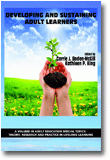
Developing and Sustaining Adult Learners
Edited by:
Carrie J. Boden, Texas State University
Kathleen P. King, University of Central Florida
A volume in the series: Adult Education Special Topics: Theory, Research and Practice in LifeLong Learning. Editor(s): Kathleen P. King, University of Central Florida.
Published 2013
Developing and Sustaining Adult Learners is the second volume in a series of scholarly publications associated with the annual Adult Higher Education Alliance (AHEA, The Alliance) conference. The title of this volume, derived from the theme of the 2012 conference co-sponsored by American Association of Adult and Continuing Education (AAACE) in Las Vegas, NV, encompasses significant issues and questions at the forefront of the field of adult education. At the conference, scholars, practitioners, and adult educators gave presentations and received feedback on some of the most significant and timely issues in their praxis. The Alliance, which values collaboration, transformative dialogue, and collegiality among professionals, considers this volume a continuation of those conversations as the presentations were expanded into chapters. We are glad that you are joining the conversation.
This volume confirms not only that adult learning, higher education, and both fields of research have many contexts, but also that there is so much more to learn about different perspectives and opportunities for research and practice. Opportunities for symbiotic relationship abound. We hope that Developing and Sustaining Adult Learners will be a book that you pull off your bookshelf, or open in your e-reader, often. We know that as we engage in program and course planning, design and teaching, this book will provide needed refreshment and new vision. When research ideas seem too similar, this volume will also provide many seeds for new opportunities.
CONTENTS
Preface. Acknowledgements, Carrie J. Boden McGill and Kathleen P. King. Introduction, Carrie J. Boden-McGill and Kathleen P. King. SECTION 1: BEST PRACTICES. Examining the Element of Trust from Multiple Perspectives in Educational Environments, Lori M. Risley and Kathleen M. Petroff. Experience of Engagement as a Starting Point, Leodis Scott. Predictors for Intrinsic Motivation: Students’ Ages and Project Based Learning, Elyse D’nn Lovell. Power to the Students: Using Critical Pedagogy to Develop and Sustain Adult Basic Writing Skills, Alfred A.Z. Siha. Reflective Writing in Unexpected Places: Implications for Student Motivation and Intellectual Development, Jill Zarestky. The New Nontraditional Student in Higher Education: Best Practices To Sustain the Millennial Generation, Gaynell Green, Kelly L. Coke, and Marlena Ballard. SECTION 2: IMPROVED PROGRAMMING FOR ADULT LEARNERS. A MutualUnderstanding: Music Learning and Adult Education, Jeremy S. Lane. Learning in Later Life: Issues and Educational Responses, Brian Findsen. Tuesdays with Trisha: A Case Study of a Tutor-Learner Relationship, Randall A. Pinder. Heutagogy: The Graduate Experience as a Complex System, Matthew A. Eichler and A. Steven Dietz. SECTION 3: TRANSFORMATIVE LEARNING. Changes in Academic Rigor Over Time: A Transformative Learning Approach to Higher Education, Rodney L. Parks, Jonathan Rich and Jan M. Hathcote. Developing and Sustaining the Gifted Adult Learner, Jackie Owen and Elizabeth Anne Erichsen. Parental (Not) Learning: Supportive and Obstructive Normalizing Practices and Transformative Learning, Ruth Michalek. Einstein and the Wright Brothers as Self-Directed, Transformative Change Agents: A Model for Generative Learning, Deanna Vogt. SECTION 4: LEARNING IN ORGANIZATIONS AND PROFESSIONAL DEVELOPMENT. Building Collaborative Partnerships through Personal Relationships, Maria Martinez Witte and Thomas J. McCormack. Exploring Professional Online Conferences for the Adult Learner, Rochell R. McWhorter, Paul B. Roberts, and Donna S. Mancuso. Intuitive Decision Making: The Wisdom of Tacit Knowing-in-Action, Jon H. Moilanen. Creating a Holistic Faculty Development Program, Marilyn Lockhart. Faculty Self-Effi cacy Beliefs: Why Do They Matter? Barry B. Leslie and Sarah J. Fishback. Rear View Mirror: A Retrospective by Retired Teachers on Learning to Teach from Novice to Expert, Kathy Peno and Elaine M. Silva Mangiante. SECTION 5: EFFECTIVE PROGRAM ASSESSMENT. Comprehensive Assessment Systems for Developing and Sustaining Adult Literacy Programs and Students in Higher Education, Leah Katherine Saal and Gerlinde G. Beckers. What do They Know? Assessing Learning Outcomes in an Adult Degree Completion Program, Carrie Johnson, Pamela J. Collins, and Jessica Millburn. Are We Measuring Up? A Leadership Development Needs Assessment for Pharmacy Practice Professionals, Keysha Bryant and Carmela R. Nanton. Conclusion, Kathleen P. King and Carrie J. Boden-McGill. About the Contributors.
-
Paperback9781623965143
Web price: $62.04 (Reg. 72.99)
-
Hardcover9781623965150
Web price: $89.24 (Reg. 104.99)
- eBook9781623965167

- EDU000000 - EDUCATION: General
- EDU002000 - EDUCATION: Adult & Continuing Education
- EDU037000 - EDUCATION: Research
-
 A Feast of Learning
International Perspectives on Adult Learning and Change
A Feast of Learning
International Perspectives on Adult Learning and Change
-
 Case Studies and Activities in Adult Education and Human Resource Development
Case Studies and Activities in Adult Education and Human Resource Development
-
 Conversations about Adult Learning in Our Complex World
Conversations about Adult Learning in Our Complex World
-
 Literacy as Gendered Discourse
Engaging the Voices of Women in Global Societies
Literacy as Gendered Discourse
Engaging the Voices of Women in Global Societies
-
 Organization and Administration of Adult Education Programs
A Guide for Practitioners
Organization and Administration of Adult Education Programs
A Guide for Practitioners
-
 Organization and Administration of Adult Education Programs
A Guide for Practitioners 2nd Edition
Organization and Administration of Adult Education Programs
A Guide for Practitioners 2nd Edition
-
 Our Stories, Ourselves
The Embodyment of Women’s Learning in Literacy
Our Stories, Ourselves
The Embodyment of Women’s Learning in Literacy

